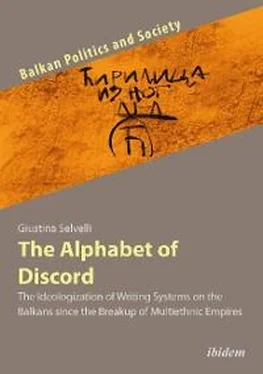In the new legal framework that recognized and established measures for the protection of minorities, special importance was attributed to the role of so-called “cultural rights,” aimed at preserving the cultural features (including language and traditions) of a given minority community, acknowledging the natural instinct of people to pass on to their children the tradition in which they themselves were brought up (cf. Fouques-Duparc 1922: 31-34). In connection with these rights, states had the obligation to fulfill three criteria: guaranteeing minorities the possibility of establishing and maintaining private associations and educational institutions; respecting the use of the minority language in the public schools; and, finally, providing the means of support for the education, ecclesiastical institutions, and charity work of the communities concerned.
A key role in managing the delicate process of transition in the post-war period was played by the League of Nations, the predecessor of today’s United Nations, which was committed to taking effective measures to ensure real protection for minorities in various European countries. This condition was considered necessary and fundamental for the preservation of peace on the old continent (Shishmanov 1926: 3). The League of Nations judged that it would prove extremely problematic to control possible irredentism, which could prove dangerous to the stability of Europe itself, if national minorities were not granted the rights they sought.
In the post-war Balkan states, a problematic process of coming to terms with the Ottoman and Habsburg heritage was underway, requiring a necessary reckoning with the legacy of a multiethnic and multilingual society. However, this process mostly took the form of a denialist attitude, which in a sense embodied the negative counterpart to the positive relationship with modernity identified with the countries of Western Europe. The Balkan countries thus inherited the task of ridding themselves of what they perceived as a kind of “historical plague,” an undertaking that proved extremely difficult (Bjelić 2011: 12). There was an obvious contradiction in this, as Europe itself imposed respect for minorities through its principles, justifying and legitimizing the presence of marginal and heterogeneous identities.
The new forces triggered by the emergence of national movements and nationalism had played a decisive role in the struggle for autonomy within the imperial multiethnic structure. These very often also determined important consequences at the level of religious organization, i.e. in the process of nationalization of the churches of the various states (see Palmieri 1913). Indeed, in the cases in question, the script controversies of the post-imperial period reveal the extent of the disintegration of the old Ottoman Christian Orthodox millet, the Rum millet. As a religious entity in control of ritual and practice, the millet had been in operation during Ottoman rule; later, the development of the Serbian and Greek national movements at the beginning of the nineteenth century encouraged a series of struggles to establish independent ecclesiastical organizations. These gave rise a few decades later to the autocephaly of the Greek Orthodox Church (1850), of the Bulgarian Orthodox Church (1870) and of the Serbian Orthodox Church (1879), which were gradually instrumentalized by their respective communities for political and national purposes (cf. Roudometof 2002: 84-85). Consequently, the idea of a commonality between members of Orthodox Christianity was gradually undermined by the emergence of particularist national interests of the new states. 4
In this context, it is important to recall the close bond between writing systems and religion that was active in this part of Europe for centuries: more than the language itself, it was the alphabet that was associated with ecclesiastical culture, a fact that in turn led to its being perceived as particularly prestigious and authoritative. Thus, in the Bulgarian context, the Cyrillic alphabet represented a stable and visible element of its culture under foreign rule, expressed according to “ethno-religious” identity criteria. Nevertheless, in the Balkans, after the end of the Ottoman Empire, religion ceased to enjoy sole dominion over local cultures, being replaced by nationalist ideologies and new forms of collective identity construction inspired by the modern principles of the Western nation-state (see Garzaniti 2009). In most cases, the “nationalizing” forces drew their strength precisely from a revaluation and glorification of the (main) national language, which was elevated to the official standard and symbol of national unity (Todorova 2009: 178-179).
Since the second half of the 19th century, numerous script and orthographic reforms had taken place, which often gained strong political significance: the linguistic element hence exercised, for the first time in modern times, a “secular” force and function within a national political program. However, as a consequence of a historical narrative shaped by “mythographic” intentions, both language and its writing system, having assumed this character, were in a sense transformed into “sacralized” elements, i.e. the cornerstone of the new national identity belief. Religious faith thus became political faith (Stantchev 2015: 130-131) and script choices consequently entailed new identity choices, in a process of nation-building that significantly weakened the original religious component of the writing systems in question.
2.3 The situation in Aegean Macedonia after World War I
In Bulgaria, the so-called “Macedonian question” was a source of bitterness since the Berlin Congress (1878) (cf. Miletich 1926), where a decisive blow was delivered to the country’s national vision and imagination. Only a few months earlier, Bulgaria had seen its political unity with Macedonia acknowledged by the Treaty of St. Stephen, in line with the already existing cultural union under the aegis of the Bulgarian Church. After the ratification of this treaty, the conviction remained alive that the Bulgarian Church, together with the Bulgarian language, would remain the only safeguard for the nation, whose unity was threatened by the fragmentation imposed by external powers. The situation continued to develop to the disadvantage of the country with the Second Balkan War (1913) and then the First World War, when almost half of the greater region of Macedonia came under Greek control, to be followed by Western Thrace with the Treaty of Neuilly 1919 (Rossos 2008: 131).
Thereafter, a process of rapid Hellenization began in the region under Greek control, called Aegean Macedonia, determined by two conventions for the exchange of alloglottic populations: the Greek-Bulgarian in 1919 and, especially, the Greek-Turkish in 1923 (Rallo 2004: 17). Through the Treaty of Neuilly, signed at the end of the First World War, Greece and Bulgaria agreed to a voluntary population exchange: about 46,000 Greeks left Bulgaria, while 92,000 Bulgarians left the Hellenic state (Pentzopoulos 2002: 60). Subsequently, under pressure from the League of Nations and in accordance with the new Treaty of Sèvres (the peace treaty signed in 1920 between the Allied powers of the First World War and the Ottoman Empire), Greece was obliged to protect the ethno-linguistic minorities on its territory by providing an adequate education system in their mother tongue (Andonovski 1985: 2).
The Treaty of Sèvres guaranteed ethnic minorities in Greece the free use of their mother tongue in all spheres, and therefore the Greek state had to ensure the establishment of a budget for the development and operation of special schools for minorities. Article 7 of the same treaty also stipulated that all citizens on Greek territory, regardless of their ethnicity, language or religion, enjoyed the same civil and political rights as well as the free use of their language in private communication, in commerce, in religion, in the press and at public meetings (Article 7, Treaty of Sèvres). Article 9 clarified that in villages and districts populated by a majority of non-Greek-speaking citizens, the Greek government was obliged to provide adequate facilities to allow primary education in the minority’s mother tongue (Article 9, Treaty of Sèvres).
Читать дальше












